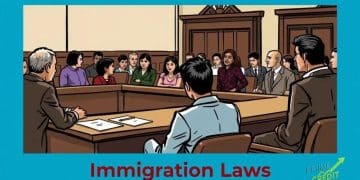Federal judge’s ruling on ICE’s wrongful deportation case

The federal judge’s ruling on ICE’s wrongful deportation case emphasizes the necessity of due process and accountability, potentially leading to significant reforms in immigration practices and operations.
The recent federal judge’s ruling on ICE’s wrongful deportation case has sparked a significant discussion around immigration laws and rights. This ruling not only impacts specific individuals but also raises questions about the broader implications for immigrant rights in the U.S. Let’s delve into the nuances of this case.
Understanding the ICE wrongful deportation case
The ICE wrongful deportation case showcases an important legal battle impacting many lives. To understand this case, we must first explore how deportations happen and the legal framework surrounding them.
What Led to the Case?
Several individuals were wrongfully deported by ICE due to clerical errors and miscommunications. These mistakes prompted a legal challenge for justice and accountability. Many families were torn apart, leading to emotional and economic hardships.
Key Legal Considerations
In these situations, several legal questions arise. For instance:
- What are the legal rights of immigrants facing deportation?
- How does the legal system address wrongful deportations?
- What safeguards are in place to prevent these errors?
Understanding the legal landscape can help clarify these issues. The rights of immigrants are essential when navigating such complex cases.
Families affected by wrongful deportations often face challenges moving forward. Many rely on community support and legal advocacy to seek remedies for their situations. Legal representation becomes vital in cases like these.
Impact on Communities
The ramifications of the wrongful deportation case extend beyond individual families. Entire communities feel the effects of these legal proceedings. There is a heightened sense of fear among immigrants, which can deter them from seeking help when needed.
Moreover, stories from these communities reflect the broader implications of immigration policies. These narratives serve to highlight the struggles and resilience of those affected.
As this case unfolds, it continues to spark dialogue about the role of ICE and the need for policy reform. Advocates call for changes that better protect immigrant rights and ensure that such errors do not occur in the future.
Key arguments presented in court

In the case surrounding ICE’s wrongful deportation, the courtroom saw various critical arguments laid out. These arguments aim to clarify the situations faced by those wrongfully deported and question the policies at play.
The Argument of Due Process
One of the main arguments revolves around the issue of due process. Advocates assert that many individuals were stripped of their rights without fair legal procedures. This point highlights the necessity for immigrant rights in deportation cases.
Errors and Accountability
Another significant focus is the mistakes made by ICE. Legal representatives argue that clerical errors and failures in communication contributed to wrongful deportations. Such lapses raise questions about accountability within the agency.
Furthermore, the defense contends that these errors are not isolated incidents. They suggest a systemic issue within ICE, emphasizing the need for reforms to prevent future occurrences. Many affected individuals deserve their stories to be heard and acknowledged.
Community Impact
An additional argument presented during the trial is the impact of these deportations on families and communities. Wrongful deportations disrupt lives, leading to emotional and economic instability. Families are often left in limbo, unsure of their futures.
These discussions within the courtroom reflect broader societal issues about how immigration laws affect vulnerable populations. During the appeals, many witnesses shared personal stories that highlighted the real-world consequences of these legal battles.
The case challenges society to think critically about current immigration practices. By shedding light on these arguments, we can better understand the profound implications they carry for individuals and communities.
Implications of the federal judge’s ruling
The implications of the federal judge’s ruling on ICE’s wrongful deportation case are significant and far-reaching. This ruling not only impacts the individuals involved but also sets a precedent for future cases.
Legal Precedents
One of the most crucial implications is the establishment of legal precedents that can affect how deportation cases are handled in the future. Courts may now examine the standards and practices used by ICE more closely, ensuring that due process is upheld.
Impact on Immigration Policy
This ruling could also prompt changes in immigration policy at the national level. Lawmakers may feel pressured to revise current laws and regulations to prevent similar injustices from happening again. These adjustments could enhance protections for immigrants, leading to a more just system.
Communities across the country will likely respond to the ruling by advocating for reform. Many advocates call for changes that support immigrant rights and ensure that individuals are treated fairly in the legal system.
Reactions from Advocacy Groups
Various advocacy groups have praised the ruling as a step forward. They argue that it sends a strong message about the necessity of accountability within ICE. These organizations plan to use this ruling to strengthen their campaigns for reform and raise awareness about the rights of immigrants.
In contrast, some individuals express concern over how this ruling might impact law enforcement efforts. They believe that stringent policies could hinder efforts to maintain national security.
Overall, the ruling signals a moment of reflection for the legal system and policymakers. It emphasizes the importance of ensuring fair treatment for all individuals, regardless of their immigration status. This case has opened doors for discussions on broader changes needed in the immigration system.
Reactions from immigrant communities

The reactions from immigrant communities in light of the recent ruling on ICE’s wrongful deportation case have been varied and deeply emotional. Many individuals and families feel a renewed sense of hope as this ruling appears to address injustices they have faced.
Expressions of Relief
A significant number of community members express relief that their struggles are being recognized in the legal system. This acknowledgment brings peace to those who have lived in fear of wrongful deportation. Many families are coming together, feeling validated in their fight for justice.
Calls for Action
However, alongside relief, there are also calls for action. Many advocates urge their communities to remain vigilant and active in fighting for immigrant rights. This ruling is seen as a pivotal moment to push for more comprehensive immigration reforms.
- Mobilizing community resources for legal support.
- Organizing rallies to raise awareness about immigrant rights.
- Building coalitions with other advocacy groups to strengthen their voices.
These actions reflect a determination to ensure that the momentum gained from this ruling leads to lasting change.
Some members of the community, while hopeful, remain cautious. They know that while this ruling is a step in the right direction, there is still much work to be done. They emphasize the need for continuous advocacy to hold ICE accountable and prevent future injustices.
The ruling has sparked essential conversations within immigrant communities, promoting dialogue about the challenges they face daily. Many individuals share testimonials about their experiences with immigration policies, connecting with others over shared stories of hardship and resilience.
This reaction from immigrant communities underlines the importance of unity and advocacy in pursuing justice. By coming together, they strengthen their resolve to fight against wrongful deportations and seek fair treatment within the legal system.
Future consequences for ICE operations
The future consequences for ICE operations following the recent ruling on wrongful deportations could reshape how the agency conducts its activities. This case highlights critical areas where improvements and changes are needed.
Increased Scrutiny
As a result of the ruling, ICE may face increased scrutiny from both the public and legal entities. Courts are likely to demand more accountability in the decision-making processes surrounding deportations. This scrutiny could lead to more rigorous checks and balances to ensure fair treatment.
Policy Changes
Future implications may also include changes in immigration policies. Lawmakers could introduce new legislation aimed at reforming how ICE operates. These changes might focus on:
- Strengthening protections for vulnerable populations.
- Improving communication and data management within ICE.
- Implementing training reforms to minimize errors.
Such policy changes can help prevent instances of wrongful deportations in the future and provide better support for immigrants.
Immigrant communities are hopeful that these developments will lead to a more just system. Activists and legal experts are advocating for reforms that prioritize human rights and dignity in immigration processes.
Long-term Impacts on Enforcement Strategies
The ruling may also influence how ICE approaches enforcement strategies. Agencies might rethink techniques used in raids and detentions, ensuring they abide by ethical standards. This shift could foster better community relations and trust among immigrant populations.
As ICE adapts to the changing landscape, it will be essential to monitor these developments closely. Continuous evaluation will help ensure that systemic issues are addressed, providing justice for those affected.
FAQ – Frequently Asked Questions about the Federal Judge’s Ruling on ICE’s Wrongful Deportation Case
What was the main outcome of the federal judge’s ruling on ICE’s wrongful deportation case?
The ruling established the importance of due process and accountability, highlighting that ICE must adhere to fair legal practices in deportation cases.
How might this ruling affect immigrant communities?
The ruling may lead to increased advocacy for immigrant rights and potential policy reforms that enhance protections for vulnerable populations.
What actions are immigrant advocacy groups taking in response to the ruling?
Advocacy groups are mobilizing communities to push for reforms, raise awareness, and ensure that the voices of affected individuals are heard.
What future changes could we expect in how ICE operates?
ICE may face increased scrutiny and pressure to implement accountable practices, leading to potential changes in enforcement strategies and immigration policies.





